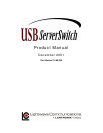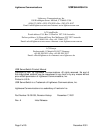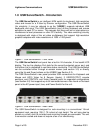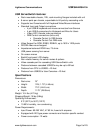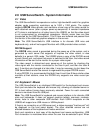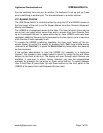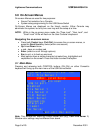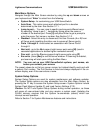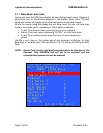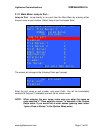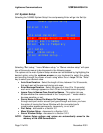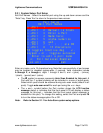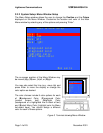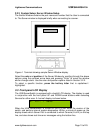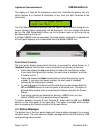Lightwave Communications USB SERVERSWITCH
www.lightwavecom.com Page 9 of 25
Main Menu Options
Navigate through the Main Screen window by using the up and down arrows on
your keyboard and “Enter” to select from the following:
• System Setup - for customizing your USB ServerSwitch.
• Auto Scan - This option scans each attached port for a duration
determined by the user. See Section 3.1.1.
• Jump to port... - You can jump to specific ports several different ways.
By selecting “Jump to port...”, navigate by typing either the name or
number of the desired port. Press [J] and press Enter to get a prompt to
enter the server Port name or number. See Section 3.1.2.
• Disabled - Select this entry to disconnect this User Console (A or B) from
all Server ports (enabling the other user to access all Server ports).
• Ports 1 through 8 - direct-select an association with Server Ports 1
through 8
• Next unit - go to the Next page of eight server ports using [N] (used in
cascaded applications to access higher-numbered servers)
• Prev unit - go to the Previous page of eight server ports using [P]
• Esc exits - press [Esc] to exit the server window. If Scanning is enabled,
port scanning will start upon exiting the Main Menu.
NOTE: You can set up your USB ServerSwitch options, port names, etc.
before you connect your servers.
The preset values do not list any server names, but instead identify each port with
a generic Port number. The Port Number is fixed and always displayed in the on-
screen display, even if the user enters a name.
System Setup Options
System Setup Options are used for system maintenance and software updates.
The System Setup options are also accessible from the Main Menu Screen, by
pressing the F1 key to access the System Setup screen. System Options include
System Flash Memory Update (F) and Load Factory Settings (F12).
Caution: Do NOT use System Setup Options during normal operation, as these
will erase all user-entered data and may require a system reset. Updating the
FLASH memory requires that the System re-enumerate (reboot) which can
interrupt normal operation.
Refer to Section 7 for System Maintenance features and instructions.



